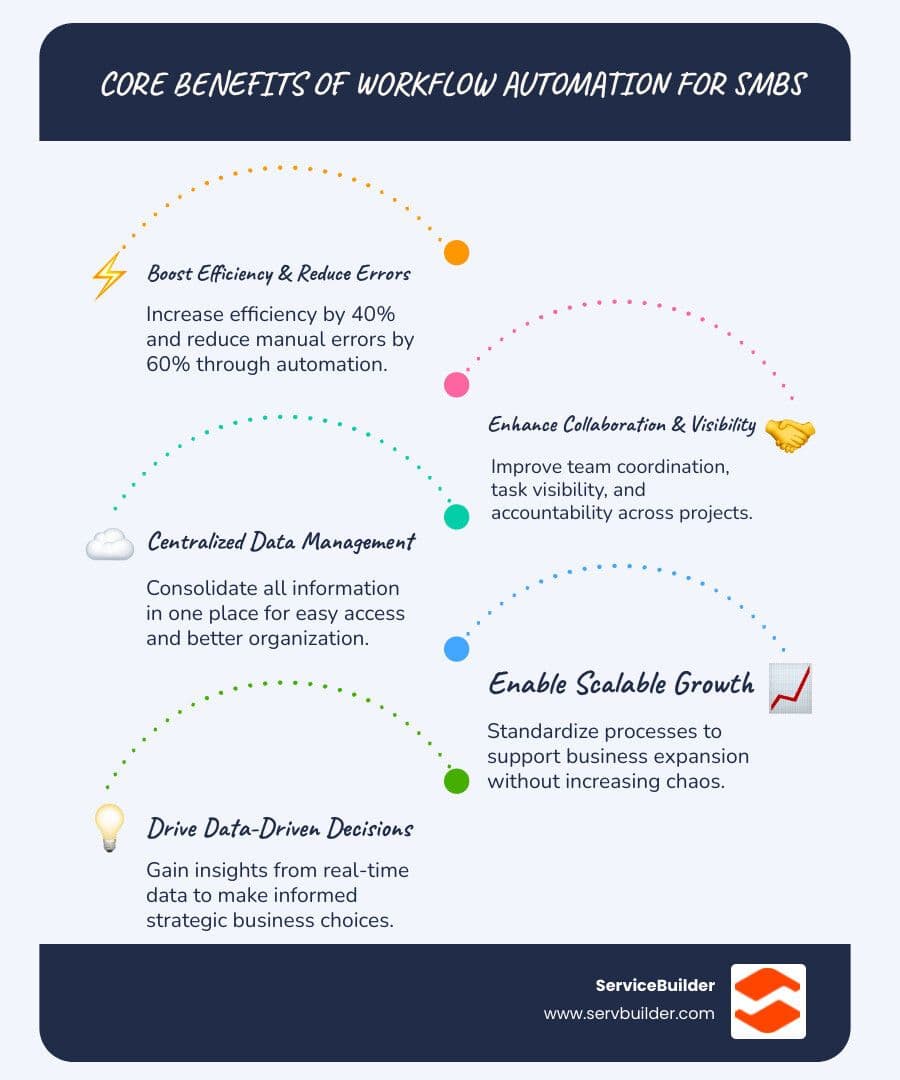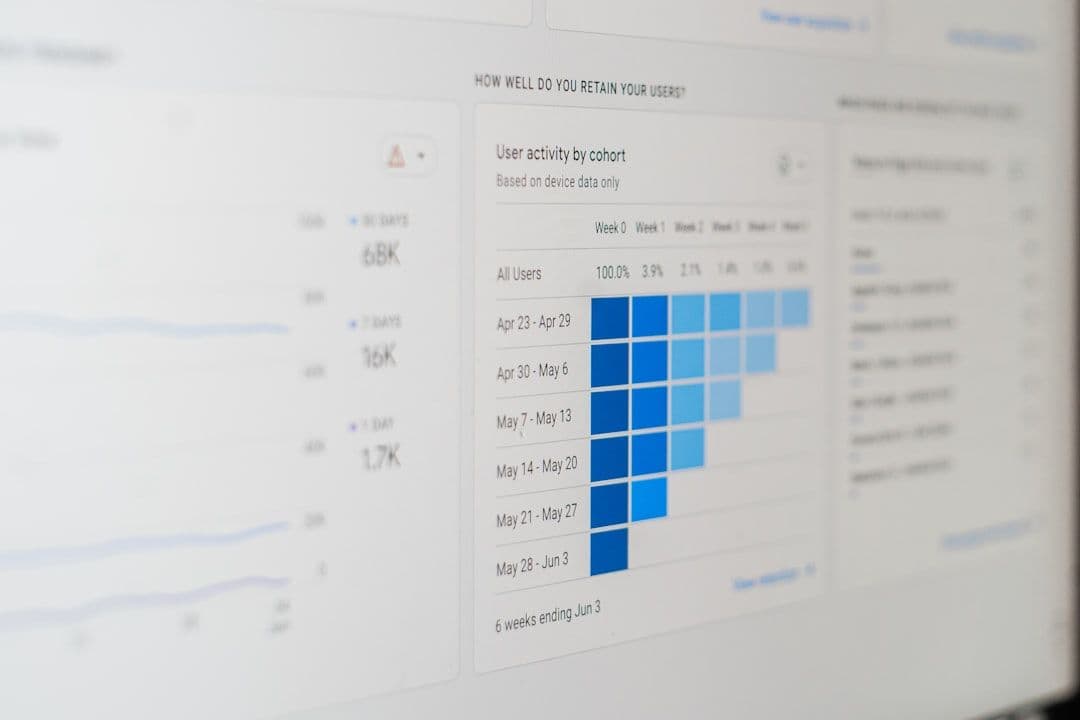Small Business Workflow Management Tools That Actually Work
- Andrew Leger
Why Small Businesses Are Turning to Workflow Management Software¶
Workflow management software small business owners use transforms chaotic daily operations into streamlined, automated processes. These tools eliminate manual task juggling, reduce errors, and free up valuable time for growth-focused activities.
Top workflow management software for small businesses:
monday.com - Visual project management with customizable workflows
ClickUp - All-in-one platform with free tier for small teams
Process Street - Checklist-based automation for recurring processes
Smartsheet - Spreadsheet-style interface with powerful reporting
Jobber - Field service-focused with mobile scheduling and quoting
The workflow management software market is expected to grow to $27 billion from $13 billion in the coming decade, driven by small businesses seeking efficiency. Without proper workflow management, teams waste hours on repetitive tasks, miss deadlines, and struggle to maintain consistency as they grow.
As Paul Chapman, CEO of Moneytree, noted: "When people were moving between teams or moving between roles, information would often get lost in email threads. Workflow software allows us to really capture all that knowledge so that we don't lose information over time."
Modern workflow tools automate everything from client onboarding to invoice approvals, providing real-time visibility into operations. For field service businesses, the right software can reduce no-shows, improve crew accountability, and streamline scheduling.
I'm Andrew Leger, and with over 15 years of experience automating workflows, I created ServiceBuilder. It's the workflow management software small business field service teams use to eliminate the operational chaos that holds them back from profitable growth.

Key workflow management software small business vocabulary:
automated accounts receivable system
automated bookkeeping services
automated business communication
Why Your Small Business Needs Workflow Management Software¶
If you're drowning in sticky notes, missed calls, and the feeling that something is slipping through the cracks, you're not alone. Workflow management software small business owners swear by isn't just another tech tool; it's a secret weapon for turning operational chaos into a well-oiled machine.
Here’s how it helps:
Improved Productivity: When software handles mundane tasks like follow-up emails, your team gets time back to focus on what grows your business: building relationships and solving problems.
Improved Team Collaboration: No more digging through email threads. When everyone can see who's doing what and when, decisions get made faster and projects move smoother.
Centralized Information: Every document, conversation, and update lives in one accessible place. This eliminates time wasted hunting for information.
Better Task Visibility: Get an X-ray view of your entire operation. Spot bottlenecks before they become disasters and know exactly where to focus your attention.
Accountability: Clarity on roles and progress tracking encourages team members to take more ownership of their work.
Scalability: The processes that work for a team of three often break down at ten. Workflow software grows with you, ensuring your efficiency doesn't disappear as you expand.
Data-Driven Decisions: Instead of making gut calls, you'll have real insights about what's working, what's not, and where your biggest opportunities lie.
For more information on streamlining your operations, check out our insights on Operations Management Tools.

Key Features to Look For¶
Not all workflow management software small business solutions are created equal. Here are the essential features:
Customizable Workflows: Your business is unique, so your software should adapt to your processes, not the other way around.
Automation Rules: Set up "if this, then that" scenarios to eliminate manual handoffs, like automatically scheduling a job when a quote is approved.
Drag-and-Drop Builder: Easily create and tweak workflows without needing a computer science degree.
Real-Time Notifications: Keep everyone in the loop with smart alerts that matter, delivered when they matter.
Reporting and Analytics: Turn daily activity into clear insights. Identify bottlenecks, track team capacity, and measure performance.
Integrations with CRM and Accounting: Connect with tools you already use to prevent double data entry and ensure information flows smoothly.
Mobile Access: This is non-negotiable, especially for field service teams who need to update jobs and communicate from anywhere.
User Permissions: Ensure the right people see the right information by controlling access levels.
Common Challenges Solved by Workflow Software¶
These tools are designed to eliminate the headaches that keep you up at night:
Missed Deadlines: Workflow software creates a safety net with automated reminders and clear timelines so tasks don't fall through the cracks.
Communication Gaps: Centralized communication within workflows means everyone has access to the same information, preventing misunderstandings.
Inconsistent Processes: Capture your best practices and ensure everyone follows them, which is critical for maintaining quality as you scale.
Lack of Visibility: Dashboards provide the bird's-eye view you need to see if projects are moving forward and lead effectively.
Onboarding New Employees: Create standardized onboarding processes to get new hires up to speed quickly and consistently.
Managing Remote Teams: Keep distributed teams connected, informed, and accountable, regardless of their location.
For more on how automation can help, explore our article on Automated Business Process Workflow.
The Best Workflow Management Software for Small Business Teams in 2025¶
Finding the perfect workflow management software small business solution doesn't have to be overwhelming. After testing dozens of platforms, we've narrowed it down to the top contenders. Each tool has its own strengths, so think of this as choosing the right team member for a specific job.
Tool Name
Best For
Key Feature
Pricing Model
G2 Rating
monday.com
Visual Project & Workflow Management
Highly visual, customizable Work OS
Per-user/month (tiered plans)
4.6/5
ClickUp
Ultimate Customization & All-in-One Solution
Extensive features, customizable views, AI
Free plan, then per-member/month (tiered)
4.7/5
Process Street
Simple, Checklist-Based SOPs
No-code checklist automation, conditional logic
Per-user/month (tiered plans)
4.8/5
Smartsheet
Spreadsheet Fans & Data-Heavy Workflows
Spreadsheet-like interface, robust reporting
Per-user/month (tiered plans)
4.4/5
Jobber
Field Service & Mobile Teams (U.S.)
Field service specific tools, mobile app, AI
Flat rate, then per-user/month (tiered)
4.8/5
Housecall Pro
Home Service Pros (Plumbing, HVAC)
All-in-one booking, dispatching, payments
Per-user/month (tiered plans)
4.5/5
Let's explore what makes each platform tick.
For All-Around Project & Workflow Management: monday.com¶
If you think visually, monday.com is for you. It's a "Work OS" with a colorful, intuitive interface that makes tracking projects easy. Its strength lies in its customization; you can adapt boards to fit any process, from marketing campaigns to client onboarding. Automation recipes handle repetitive tasks, like notifying team members when a step is complete. While it's intuitive for basic use, mastering its advanced features has a learning curve.
For Ultimate Customization & Collaboration: ClickUp¶
ClickUp is the Swiss Army knife of workflow tools, aiming to replace multiple apps with one all-in-one platform. It handles tasks, documents, goals, and chat in one place. Its multiple views (List, Board, Gantt) cater to different team preferences, and its task dependencies are great for complex projects. ClickUp offers a generous free forever plan, making it accessible for small teams, but its sheer number of features can be overwhelming at first.
For Simple, Checklist-Based Processes: Process Street¶
Process Street excels at turning your standard operating procedures (SOPs) into smart, automated checklists. It's perfect for recurring tasks like employee onboarding or quality control. Its no-code workflow automation and conditional logic allow checklists to adapt based on user input, ensuring no steps are missed. It's highly focused and not built for general project management, and its pricing can be steeper than other tools.
For Spreadsheet Lovers: Smartsheet¶
For teams who live in Excel, Smartsheet bridges the gap between spreadsheets and modern workflow management. It has a familiar spreadsheet-like interface but adds powerful collaboration, automation, and reporting features. You can easily switch between grid, card, and Gantt views while using the same data. Its powerful reporting is a major plus for data-driven businesses. However, it may feel less intuitive for teams not accustomed to a spreadsheet-first approach.
For Field Service & Mobile Teams: Jobber¶
If you run a field service business (HVAC, lawn care, cleaning), generic tools often miss the mark. Jobber is purpose-built for field service operations, handling scheduling, quoting, and invoicing. Its mobile app is critical, allowing crews to access job details, update status, and communicate from the field. Features like GPS tracking and AI tools for call handling are designed for the unique needs of service businesses. Jobber is not a general-purpose tool for office tasks, but it excels at managing the core revenue-generating workflows of a service business.
For All-in-One Home Service Management: Housecall Pro¶
Another major player in the field service space, Housecall Pro is an all-in-one platform popular with home service businesses like plumbers, electricians, and HVAC technicians. It excels at streamlining the entire customer lifecycle, from online booking and dispatching to invoicing and payment processing. Its strong marketing features, such as automated review requests and postcard campaigns, help businesses grow their customer base. While comprehensive, some users note that its interface can feel busy compared to more modern, streamlined alternatives.
As the team behind ServiceBuilder, we understand these challenges intimately. ServiceBuilder is our modern take on field service management, designed for U.S.-based HVAC, lawn care, cleaning, and pest control businesses. We focus on the mobile-first experience, AI-assisted scheduling, and real-time coordination that field teams need, without the complexity of legacy enterprise systems.
How to Successfully Implement Workflow Software in Your Business¶

Choosing a tool is only half the battle; successful implementation is key. Here’s how to ensure your new software doesn't gather digital dust.
Identify Bottlenecks: Before you automate, understand where your current processes break down. Target these specific pain points first.
Start Small: Don't try to revolutionize your entire business overnight. Pick one high-impact workflow, perfect it, and then expand. Success breeds confidence.
Involve Your Team: The people using the software daily must be part of the selection process. Their buy-in is essential for adoption.
Provide Training: Schedule dedicated time for hands-on learning and create simple guides. Designate a "workflow champion" to help colleagues.
Measure Success: Establish key performance indicators (KPIs) beforehand, like time saved per task or reduced errors. Track these metrics to prove the ROI.
For deeper insights, check our guide on Business Operations Management Tools.
Choosing the right workflow management software for your small business¶
To find the right fit, focus on these areas:
Assess Your Needs: List your must-have features versus nice-to-haves. What specific problems are you trying to solve?
Consider Your Budget: Be realistic about what you can afford. Most tools charge per user, so factor in team growth. Use free trials extensively.
Prioritize Ease of Use: If the software isn't intuitive, your team won't use it. Look for clean interfaces and drag-and-drop functionality.
Check for Essential Integrations: Ensure the tool connects with your existing systems like QuickBooks or your CRM to avoid manual data entry.
Evaluate Customer Support: When you need help, responsive support is critical. Look for vendors with live chat or phone options.
Plan for Future Growth: Choose a scalable solution that can handle more users and complex workflows as your business expands.
Overcoming Potential Drawbacks¶
Even the best software can face challenges. Here’s how to handle them:
Adoption Resistance: Communicate the personal benefits to your team—how it makes their job easier. Involve them in the setup to turn resistors into champions.
Cost Concerns: Calculate the ROI. The cost of the software is often far less than the cost of inefficiency, missed appointments, or delayed invoices.
Over-complicating Workflows: Keep it simple. Start with a basic workflow and add complexity only when necessary.
Data Security: Choose vendors with strong security practices like encryption and regular backups. ServiceBuilder, for example, is built with a privacy-first architecture.
The Importance of a Free Trial: Never commit without a hands-on test. A free trial is the best way to know if a tool truly fits your team and workflow.
Frequently Asked Questions about Workflow Management¶
When considering workflow management software small business owners often have the same questions. Here are the straight answers to the most common concerns.
What's the difference between workflow management and project management software?¶
The distinction is simple. Workflow management software focuses on optimizing repeatable business processes that happen daily, like invoice approvals or client onboarding. The goal is consistency and efficiency.
Project management software is for planning and tracking unique, time-bound projects with a clear start and end, like a website redesign or office move. It excels at timeline and resource management.
Many modern platforms like monday.com and ClickUp blend both capabilities, allowing you to manage recurring tasks and one-off projects in one place.
Can free workflow software really handle my business needs?¶
Free plans are a fantastic starting point for very small teams or for testing features. ClickUp's free tier, for example, is quite robust. However, free plans inevitably come with limitations on users, storage, or advanced automation.
Most growing businesses eventually need to upgrade to a paid plan for full functionality, support, and scalability. Think of a free plan as a test drive before you buy the car.
How does workflow software help a small business scale?¶
Scaling without chaos is one of the biggest benefits. Workflow software helps by:
Standardizing Processes: It captures your best practices in documented, repeatable workflows. This ensures new hires maintain quality and consistency from day one.
Automating Volume: As business increases, automation handles the extra administrative load without requiring more staff. It's like having invisible assistants.
Providing Strategic Insights: Centralized data reveals patterns and bottlenecks, helping you make smarter decisions about growth and resource allocation.
For field service businesses, this data is invaluable for optimizing routes and understanding customer patterns. Our guide on CRM Solutions explores how centralized data fuels growth.
Conclusion: Automate Your Operations and Focus on Growth¶
We've covered why workflow management software small business solutions are no longer a luxury but a necessity. The goal is simple: stop wasting time on repetitive manual tasks and start focusing on the work that actually grows your business.
Empowerment through automation gives your team the tools to work smarter, not harder. This frees up time for strategic thinking, customer relationships, and innovation.
For general office workflows, versatile platforms like monday.com and ClickUp are excellent choices. They offer the customization needed to streamline internal operations.
However, for U.S. field service businesses—HVAC, lawn care, cleaning, pest control—your needs are different. You manage mobile crews, on-site jobs, and real-time scheduling. Generic tools often fall short.
This is where ServiceBuilder provides a purpose-built solution. We understand the unique challenges of field service. Our mobile-first experience, AI-assisted scheduling, and real-time updates are designed to streamline your specific operations without the bloat or high cost of enterprise systems.
Don't let operational chaos hold you back. Whether you choose a general platform or a specialized solution, taking the step toward automation will reduce stress, improve efficiency, and set the foundation for sustainable growth.
Ready to see the difference? Explore how ServiceBuilder can streamline your business and get your operations running like clockwork.